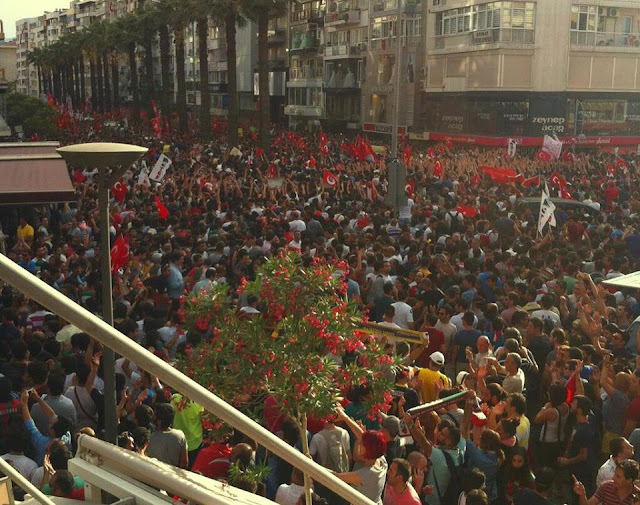Politics
Inside Story: Occupy Gezi Movement in Turkey; Development Is Not Always Good
One Aspect of the Story
On 28th May 2013, a group of around fifty people independent of any organization launched a protest in the Gezi park in Istanbul against the demolition of the same to prevent the seventy years of greenery in the city centre from converting into yet another shopping mall, which are already present in bulk in the city of Istanbul. On 30th May, trees were scheduled to be cut down in the morning, but before that could happen, people went to the park previous night with their family, blankets and tents to sleep under the trees whose shade they might not have enjoyed from the next day.
The Other Side of the Story
Updates
1. The unique ID which every policemen have on their helmet has been painted to hide it. Police force is becoming harsh to control the ongoing Occupy Gezi protest across many cities in Turkey.
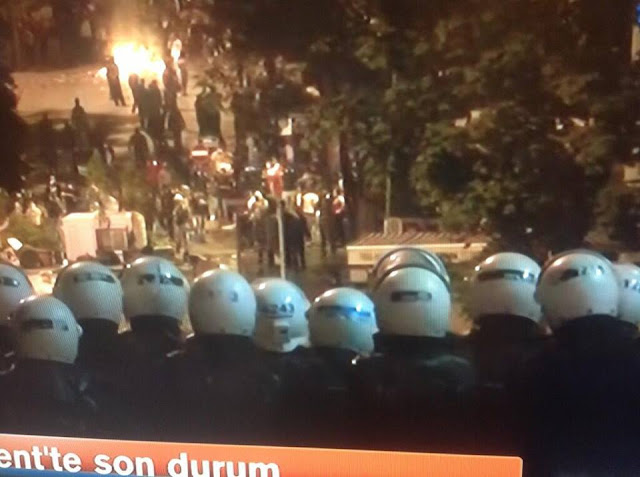 |
| Click to Enlarge. Source: Unknown |
2. Police controlling the protests brutally with pepper spray and water canon is causing more anger and rise of support for the protesters in Turkey and around the world.
 |
| Click to Enlarge, Source: Unknown |
3. A 22 year old young men shot dead in Antakya during the protest. The City Governor’s Office informed that they couldn’t yet confirm if the bullet was shot by a cop.
4. Two days union strike and universities postponing exams will result into more gathering and strengthening of protests.
In a tough response, Davutoglu held a telephone conversation with Kerry and accused the U.S. of treating Turkey “as a second-class democracy.” He also complained that Washington did not react to similar protests in other countries.
8. Israeli political expert Avigdor Eskin believes a military coup could be possible in Turkey, “At present, a military coup is also possible, given that it once had happened in Turkey before. If the police display violence and the victims to clashes reach significant scales, a new military coup is quite possible,” He told Arminfo
India
Government Changing Syllabus to Include Sikh History in India
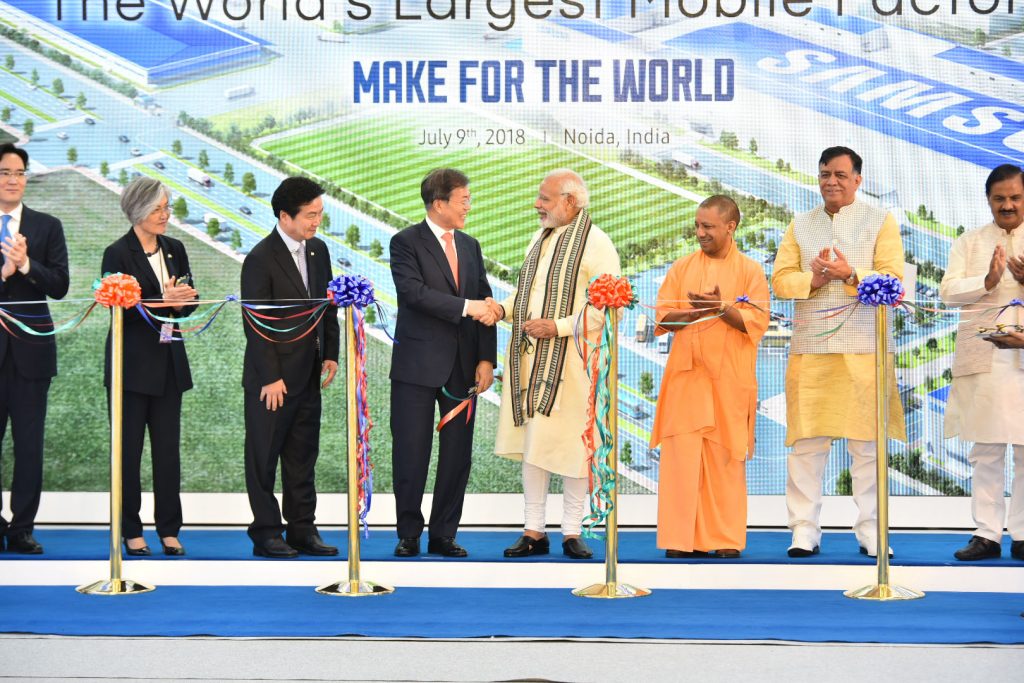
Chief Minister of Uttar Pradesh, most populous state in India, has announced inclusion of Sikh history in the state syllabus. Students of all schools under UP State Board will see the new chapters. The announcement came when Chief Minister Yogi Adityanath (BJP) was observing Sahibzada Diwas.
Why do we Observe Sahibzada Diwas?
Sahibzada Diwas marks the martyrdom of four ‘sahibzada’ (or sons) of Guru Gobind Singh (10th Sikh Guru) and his mother Mata Gujri. In the year 1705, Mughal Emperor Aurangzeb had ordered torturing of youngest sons of Guru Gobind Singh aged 5 and 8. He later executed the little sons by burying them alive into a wall. The reason for this act was that they refused to convert to Islam. Soon after this event Guru Gobind Singh’s mother, Mata Gujri also martyred her life under Aurangzeb’s captivity. The cause of her death is still unclear. Guru Gobind Singh’s other two sons martyred their life in the Battle of Chamkaur Sahib. Thus the 10th Sikh Guru, Guru Gobind Singh had lost his whole family by 27th December. This is an important event in the Sikh history in India and UP Government is finally keen on observing Sahibzada Diwas every year.
Why UP Government is Changing the Syllabus?
Soon after the independence of India in 1947, the school education came under tight grip of far left and communists. Most of the Indian history in the recent past has been written by Romila Thapar and Irfan Habib. They have close ties with left wing ideology and Irfan Habib has delcared himself as Marxist. They wrote history text books by either phasing out sections of Indian history or diluting certain events. The motivation to soft alter the history has been to propagate left-wing/communist ideology. Historian Koenraad Elst once highlighted that Romila Thapar is comfortable neither in Sanskrit nor in Farsi language. The knowledge of these two languages is a must to understand India’s history.
In the recent years, various public opinions have gained momentum to rewrite Indian text books to include more content on Indian rulers and native ideas. Currently, Indian text books mainly teaches about foreign rulers of India such as Mughals and British.
With this announcement of inclusion of Sikh history in history text books, the government is bringing historical facts in mainstream.
27th December as Real Children’s Day
Chief Minister Yogi Adityanath has also reached out to the Education Minister to declare Sahibzada Diwas as Children’s day. He further added that “The history of Sikh gurus will be a part of the syllabus. Apart from this, we should observe December 27 every year as Sahibzada Diwas in all schools. Today is the day to pay gratitude to the sons of the Guru and mother who martyred their lives for the motherland, country and religion.” Yogi Adityanath also said that “No society can move ahead if it forgets history. The Sikh society is known for its hard work. The Sikh gurus sacrificed their lives to defend the Hindu religion. The country will always remember this.”
Yogi Adityanath added that learning about the sacrifices by Sikh Gurus would inspire future generations to dedicate themselves into nation-building. He emphasized that we should make future generations realize that India and Indian culture was safe because of sacrifices of Sikhs.
What Should We Do On Sahibzada Diwas?
Sahibzada Diwas should be an important day for every Indian regardless of their region, culture or religion. On this day, we are in the Holiday mood as it falls right between Christmas and New Year’s eve. However, we should remember that a Guru and his entire family sacrificed their life for the well being of India and the idea of India.
On this day we can fast, do sewa (service), visit a nearby Gurudwara and sleep on the floor at night.
China
Ridiculous Tariffs on Wines – China Australia Trade War Explicated
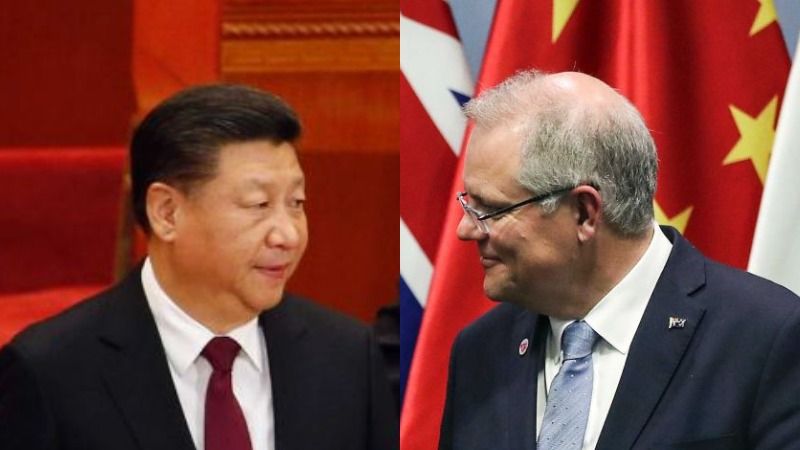
Earlier in November 2020, Communist China slapped Ridiculously high tariffs up to 212.1% on Australian wines. These tariffs were in the response of ongoing trade war between Communist Party of China and Australia. China is the biggest importer of Australian wines making up a whopping 39% of Australia’s total wine export. Australia has already raised concerns at a WTO meeting about China taking measures against its barley, wine, meat, dairy, live seafood, logs, timber, coal and cotton, according to a reuters report.
How did China – Australia trade war begin?
China and Australia shared one of the best times in their relationship after Kevin Rudd from the centre-left Labour party came to the power in Dec 2007. During his leadership Australia decided to pursue appease China policy which included steps such as:
- Chastising Taiwan for its renewed push for independence and reiterating support for a one-China policy in favor of People’s Republic of China. (Source: The Age)
- Signing a A$50 billion deal with PetroChina in 2009 (largest contract ever signed between the two countries) that ensures China a steady supply of LPG fuel until 2029.
- Unilaterally announcing departure from Quadrilateral Security Dialogue to appease China.
Nosediving of China – Australia Relationship
The course of this partnership changed when Julia Gillard from the centre-left Labour Party took over the leadership and initiated closer partnership with United States. This included revival of interest in Joining Quadrilateral Security Dialogue and stationing of US troops near Darwin, Australia.
In 2013, Tony Abbott from centre-right Liberal Party took over the leadership. During his term Australia saw some confusion in its China Policy. His Defence Minister Senator David Johnston told in a statement that Australia is seeking to balance their relationship between China and the United States. It was during his term when Australia and China established a Free Trade Agreement.
However, the relationship between Australia and China took a downturn in 2015 when Malcolm Bligh Turnbull from the centre-right Liberal Party came into power. This is the point in history which has led to current trade war situation between Australia and China.
- Australia became the strongest opponent of China’s territorial claim in South China Sea.
- Banned foreign donations to Australian political parties and activist groups in a move to target Chinese interference in Australian democracy.
- Revived Quadrilateral Security Dialogue with United States (Donald Trump), India (Narendra Modi) and Japan (Shinzo Abe). This was the time when Quadrilateral Security Dialogue saw hope of becoming something bigger as all four countries had centre-right governments who had a clear China Policy.
2019 Onwards: China – Australia Trade War
In 2019, relationship between the two countries further took a dip with Scott Morison from centre-right Liberal party becoming the Prime Minister. During his leadership:
- Australia signed a letter condemning China’s mistreatment of Uyghurs and other minorities.
- Suggested investigating the cause of Covid 19 in April 2020, which resulted into an angry response from China threatening to reduce Tourism and Trade.
- Opposed the Hong Kong National Security Law in June 2020.
- Reiterated its support for ethnic minorities in China and freedom in Hong Kong in October 2020
- Demanded a formal apology from China for posting a fake image of an Australian soldier holding a bloodied knife against the throat of an Afghan child
In conclusion, these continuous attack on China made China so angry that they deliberately leaked a list of 14 points suggesting why China is angry at Australia
China’s attempt at “buying” left wing politicians around the world
Recent trend is suggesting China’s attempt at “buying” influential left-wing politician around the world. In November, 2017 Australia’s Labour Party’s MP Sam Dastyari went against his own party on South China Sea. He later quit his party after he was found of taking financial favours from China.
In 2008, India’s Centre-left party – Indian National Congress signed a Memorandum of Understanding with Communist Party of China. Its contents are still hidden from the Government of India and the people of India.
Recent US Report has shown concern on President Elect Joe Biden not clearing doubts on his China policy.
How Can we Help Australia Post Ridiculous Tariffs on Australian Wines?
In 2020 China has directly or indirectly impacted many of our lives. Some of us have lost our jobs, some of us are taking a reduced salary. In fact, some of us are sitting at home instead of travelling; while some of us have lost our loved ones only because of communist party was incapable of controlling a virus outbreak.
As the entire world is struggling with this virus, Chinese economy continues to be on path of surpassing the US. Therefore, we should pledge to minimize buying Chinese products. It might be impossible to completely boycott Chinese products, but we can at least minimize it.
Install Cultivate Chrome Extension (non sponsored/affiliate link – We are not getting paid to post this). This plugin works on both Google Chrome and the new Microsoft Edge. It helps you understand the origin and seller location of a product on Amazon. It is a great tool to minimize your dependence on Chinese products. If you are lucky, this extension will also suggest some Made in USA alternatives
Buy Australian Wines – Australia desperately needs a new market for its wine and other products. This New Year and Christmas season, we should pledge to celebrate with at least one Australian wine!
India
Congress’s Electoral Enervation
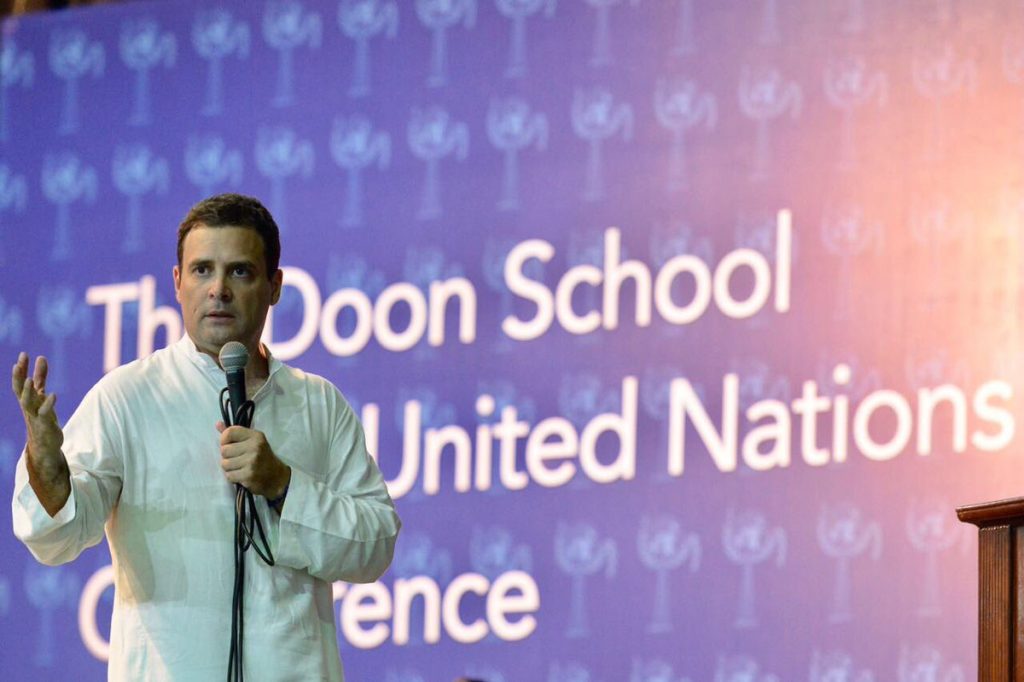
BlakeShramster / CC BY-SA
Lately, the Grand Old Party of India has been suffering from severe political lacerations. It is bleeding profusely but it still refuses to recognize and feel the pain of its grisly wounds. The Congress party is obstinately practicing political podsnappery and this is further eviscerating its relevance. Slowly and steadily, its ideological roots are being chipped away. We are witnessing a kind of dilemmatic democratic party, which is strangulating in the ever-shifting tectonic plates of Indian politics. The fresh act of defection by Jyotiraditya Scindia foregrounds the ideologically weak aura which now surrounds the Congress.
In every period of its history, a particular type of ideological encrustation surrounded the Congress and illuminated its charm among the Indian voters. This ideology rooted it firmly in a vast network of ideologies. This ideology, for the most part, has been secular and liberal and acted as a strong bulwark against a xenophobically framed anti-secular strategy. But now, this prodigious party has shrunk to a miniscule group. This cataclysmic contraction has happened primarily due to the elitist imagery to which it was tethered. Congress’s political rivals portrayed it as an inherently elitist group by harping on its corruption scandals like the Satyam Scam, Coal Scam, Chopper Scam, Adarsh Scam and Tatra Truck Scam. All this overemphasis on the financial impurity of the Congress led to the citizens believing that the Congress party is an aristocratic admixture of kleptocracy and bogus secularism.
The political dynasticism of the Congress further solidified this elitist imagery and soon, Congress became the ‘suit, boot ki Sarkar’. The usage of the aforementioned epithet successfully established the presence of the Congress party as a technocratic liberal party, accustomed to high-handed bureaucratic methods of administration. The attribute of a ‘pro-people party’ was snatched away from the Congress and it was represented as a technocratic group, largely unconnected from the material conditions of the citizens.
Apart from the political and financial palm-greasing, the Congress has also been disemboweled due to its confounding ideological quagmire. The Grand Old Party is stuck in a regal fort, where it is continuously wavering between a secular strategy and a thinly-veiled contrivance of religious pandering. It has already flip-flopped on its ideological plank by pitching Rahul Gandhi as a religious leader which actually backfired because people at once understood that he had suddenly become a synthetically Hinduized leader.
And now, it is lending its support to the Anti-CAA protests and has all of a sudden, arrived like a knight in shining armor, chaotically shouting secular slogans. Opportunistic acts like these cause severe trust deficit and the party incurs widespread odium for its electoral opportunism. So, due to the Congress’s ideological shilly-shally, its attempt to provide guidance to the Anti-CAA protests is seen as a crude act of politically hijacking the protests. To say succinctly, the Congress has been utterly passive in reacting to some major political events and has not even tried to extend its sinews to drag itself out from the quicksand of financial dissoluteness and ideological vacillation.
Due to all the above mentioned iniquitous inadequacies, Congress is withering and losing its elephantine presence on the electoral platform. This is the most appropriate time for the Congress to recognize its Achilles heel and try to overcome this deficiency. The defection of Jyotiraditya Scindia highlights the fact that now, an ideological string no longer ties any Congress member and the party needs to alter its highly feudal organizational structure which is identical to a form of royal structure, based on monarchical munificence. The Congress party can utilize the following remedial measures to perform the medical operation which is indispensable for it to regain its health.
Constitutional Struggles
It should try assiduously to interconnect itself with the common masses and change its political behavioral pattern by staging what can be called ‘constitutional struggles’. These constitutional struggles will essentially be democratic demonstrations, aiming to recover the lost sheen of the constitution. These protests should be able to blend constitutional patriotism with a Gandhian non-violent idea of struggle. In this way, the Congress party would be successful in politically fructifying its vast receptacles of historical significance and will harmonize its history as a torchbearer of freedom with the present calamitous conditions. One important reason behind the need to make Mahatma Gandhi the vanguard of Congress’s recuperation struggle is the vast space which he occupies in the collective imagination of the Indian citizens. By spotlighting Gandhi, the Congress party can easily initiate a resistance movement whose objective will be to find the Gandhian truths in this age of political prevarications and fabrications.
Change Organizational Configurations
The Congress party needs to change its organizational configurations. The sybaritic structure of dynasticism should be superseded by a bottom-up approach which is decentralized. The present organizational architecture is extremely centralistic and all the members of the Congress party are seen as the supine members of a sycophantic entourage, revolving around the singular nucleus of nobility, which has invariably been the Gandhi family. The senior members of the Congress party such as Ghulam Nabi Azad, Ahmed Patel and Manmohan Singh are depicted as the servile stooges of the Gandhi family who possess an unbreakable fidelity to the dynastic autocracy of the Congress party. The congress leadership is also currently rudderless. During the elections, it played the role of a dabbler. After Indira Gandhi, all the Gandhis (Except Sanjay Gandhi) were reluctant politicians. They were compelled because the Nehru – Gandhi name was associated with the party. All these aspects of party functioning need to be radically changed so that non-Gandhi members are not seen as mere appendages of the supposed undisputed overlord which is the Gandhi family. (3) A coherently unified ideological political programme needs to be built. The lumbering party is in a state of delirium and is unable to properly specify its political stance. It should solidly settle this predicament by choosing to continue with its former political posture as a truly secular and democratic party, committed to constitutional values. If this operation is not undertaken, the Congress will be finally consigned to the political graveyard, where it will die with its shambolic ideological structure.



